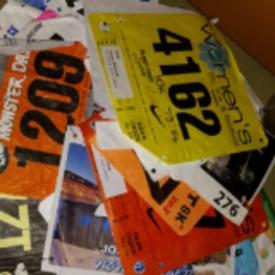Constantly injured

tmbg1
Posts: 1,681 Member
Every time I get on a roll with my fitness, something derails me. Right now it's my knee, but it's been my foot, my hip, etc. Do y'all manage to get in daily exercise without injuries? What's your secret??
0
Replies
-
Yeah, I’m with ya on this. I can tell by my google searches when things go awry - meniscus, lumbar spine, costochronditis, etc - all reveal some way I think I hurt myself. I started learning about progressive overload in my late 40s - so I think I may have overdid it - got a little too gung-ho at times - not recognizing the limits of a 50 plus year old body.
I actually have taken a month off from lifting and will start back tomorrow. I’ve just been dancing - a lot - and walking - no complaints - and am below my goal weight. When I start back tomorrow I will follow a strength training video for women over 50, and substitute certain moves for more “injury proof” ones - not totally injury proof of course, but less likely. So Bulgarian squats instead of squats, single leg deadlifts instead of deadlifts, etc - learning from the research I’ve been doing.
Truth is one strong squeeze doing a one arm dumbbell row had me stop training for a day or two. Who thought of this aging thing?!! But better than the alternative 😂2 -
Sometimes, in my bleaker moments (at 65), it seems like poking around in a minefield, wondering where I'll find the next explosion. 😆
In reality, it's learning experiences, with temporary setbacks.
I didn't start being routinely active until I was around 46, and I was in pretty bad shape: Inactive long term, just coming out of cancer treatment (chemo and the whole nine yards) among other things. (I'm now 65, for context.) Even then, I stayed obese, while quite active (even competing as an athlete, not always unsuccessfully, for another dozen years.
Every time something happens, I learn from it. For a while, often, I need to work around it.
Example stuff:
I have a torn meniscus (at least one knee, maybe both), some osteoarthritis in knees, hips, back. I've learned I need to avoid impact on my knees (running, for example), torque on my knees (most dance-y exercise, fast-break games, etc.). What works, sustainably, for me? Straight-line knee hinging with pressure but minimum impact. Biking, rowing - good. Plenty intense enough for CV fitness and to make progress. Daily yoga/stretching is better than irregular, narrowing down when time is limited to specific exercises that have the biggest payoff for me.
I'm always at risk of over-stressing those knees, and have some history of shoulder nerve impingement. Lessons/learning: Must not do lateral raises. Need to be cautious with lunges, squats: Angles, weights matter. Lots of other things are OK. I'm better off increasing reps, before (or instead of) increasing weight. (For someone else, the exact opposite could be true, though I've seen trainers who work a lot with older folks say "reps before weight increase" can be commonly useful).
Overall, these days I make it a point to increase gradually, in any combination of intensity/duration/frequency, and to pay attention to how I feel as I do it. Cumulative fatigue is a thing. When I occasionally add a new form of exercise, I think how it's biomechanically similar to other things I've done, and what that means. It can cut either way: If I do something similar to what I've been doing, I might tolerate it better . . . or it might add to cumulative stress to create potential overuse risk.
For me, paying attention to how I feel is *huge*. So is watching possible objective indications of overdoing: Resting heart rate, pace on "just ramble" walks, sleep quality, pain points, and that sort of thing. The plus of active aging is that I know myself pretty well at this point, so can notice things if I pay attention.
In normal (non-pandemic) times, I've relied on things like a good massage therapist with sports-med credentials (not just "relaxation massage"), osteopathic manipulation from a doctor at a university-based practice - both of whom have given me exercise/stretch recommendations that help me - plus physical therapy every time I can get it, and attention to nutrition, sleep, hydration, stretching/flexibility, all those potential contributing factors.
Yeah, it gets more challenging, and can be more frustrating. At the same time, I learn, have better self-insights, know more about techniques and tools.
It varies over the seasons, but I think mostly I'm able to stay pretty active. The people I see around me, my age and beyond, who stay active: They have better quality of life, no question. I figure I need to be wily enough to figure out how to keep going. 🤷♀️2 -
Minefield analogy is on point. I've also heard it compared to "whack-a-mole" with each injury that heals a new one pops up.2
-
I damaged my rotator cuff about 10 years ago and re-agravated it about 18 months ago doing a 30 day yoga challenge, of all things!
I'm 61 and what I have learned that works best for me is that I need lots of variety in my workouts, otherwise I experience grief. I do yoga, strength training, and depending on the season, I xc ski, snowshoe, run, canoe, and kayak. During non-COVID times I also do a spin class, a deep water running class, and dragon boat. I walk or hike with the dogs every day.
In other words, I can do lots of different things, but other than walking, I can't do anything that requires the same motion on back to back days. In fact, I have to leave two full days between runs.
I couldn't imagine not doing something every day, but I plan my week so that I can fit in everything I enjoy, but not feel pain (which of course is totally different to that wonderfully satisfying feeling of DOMS). The positive is that I don't get bored or injured. The negative is that I'm not particularly exceptional at anything LOL
On a side note, I'm excited because I have an appointment with my RMT (registered massage therapist) tomorrow, the first visit since COVID started. She does wonderful things for my shoulder and I've missed her so much.3 -
So I have gone a good bit with no injuries, and then yesterday I stubbed my pinky toe. Sounds small but it huuuurrrttttss! It's always something!1
-
This discussion has been closed.



